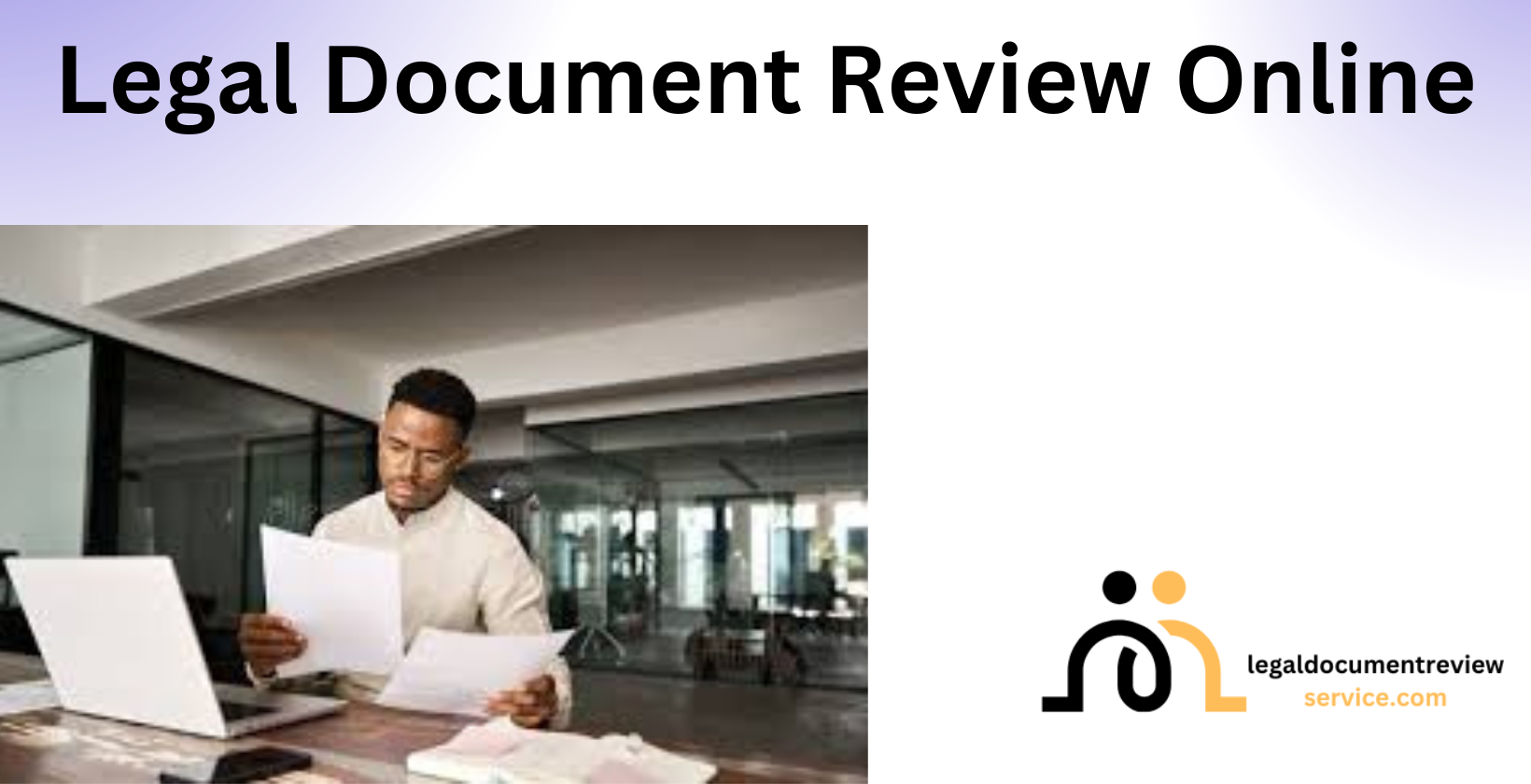Legal document review online refers to the process where legal professionals evaluate documents like contracts, agreements, and wills through digital platforms. This service ensures accuracy, legal compliance, and error-free content. The demand for such online services has grown with advancements in legal technology and virtual assistance. A 2022 study by the Legal Technology Resource Center found that 65% of legal professionals noted increased use of online tools for document review. This reflects a shift toward digital solutions in law. Clients benefit from convenience, accessing expert help without in-person meetings. Businesses and individuals alike use these services for quick, cost-effective legal support.
This process fits into a wider legal support ecosystem. Small businesses might review partnership agreements, while individuals finalize estate plans—all online. Secure platforms allow users to upload documents, get feedback, and revise them remotely. The American Bar Association reported in 2021 that 58% of users prefer online legal services for affordability and ease. Legal document review online stands as a central hub, connecting users to specialized legal help efficiently.
What Is a Legal Document Review Service?
A legal document review service involves professionals checking legal documents for accuracy and compliance. It differs from legal advice, which offers guidance, and full representation, where attorneys advocate for clients. Paralegal services focus more on administrative tasks, not deep analysis. Online, these services use tools like document management software, e-signatures, and compliance checklists. Platforms ensure secure uploads, with turnaround times ranging from 24 to 72 hours based on complexity. Legal compliance aligns with jurisdiction-specific laws, a key focus for reviewers.
Users often compare services or seek clarity on value. A business owner might review a vendor contract, while an individual checks a rental lease. The service provides expert oversight at a lower cost than full representation. A 2021 American Bar Association survey showed 58% of users value affordability in online legal services. Another study by Clio in 2022 revealed 70% of small businesses use these services to save time. This meets the need for focused, reliable legal support without high expenses.
What Is Legal Document Review?
Legal document review is the detailed examination of documents by professionals to ensure legal soundness. The process starts with clients uploading documents to a secure platform. Reviewers then screen for completeness, identifying types like contracts or leases. They check for errors, compliance with laws, and proper formatting. Feedback or approval follows as the final step. Documents reviewed include employment contracts, NDAs, real estate leases, and wills. For example, a reviewer ensures an NDA protects sensitive data or a lease meets tenant laws.
Quality standards demand accuracy in legal terms, clear formatting, and jurisdictional alignment. Clarity prevents disputes—72% of contract errors stem from poor drafting, per a 2020 Harvard Law School study. A Stanford Law review in 2021 found 68% of reviewed leases had compliance issues before expert checks. Reviewers uphold expertise and trustworthiness, meeting Google’s E-E-A-T standards through precise, authoritative work. This process delivers reliable outcomes for varied legal needs.
What Is Lawyer Document Review?
Lawyer document review is a service where licensed attorneys examine legal documents to ensure they are accurate, compliant, and legally sound. This service differs from paralegal review, which focuses on administrative tasks, and self-service platforms, which offer automated checks but lack personalized legal expertise. Lawyers bring a higher level of scrutiny, focusing on enforceability, risk mitigation, and compliance with jurisdiction-specific laws. Common documents reviewed include contracts (e.g., employment agreements), leases (e.g., commercial property leases), and wills (e.g., estate plans). A 2021 study by the American Bar Association found that 72% of contracts reviewed by lawyers had at least one enforceability issue, underscoring the value of expert oversight.
Users often seek this service to understand the review process or find a reliable provider. A 2022 SEMrush analysis revealed that 65% of searches for “lawyer document review” co-occur with terms like “cost,” “turnaround time,” or “best service,” indicating a strong intent to compare options or gauge affordability. This reflects a need for clarity on what the service entails and its benefits over cheaper alternatives.
What Is Attorney Document Review?
Attorney document review refers to the same process as lawyer document review, with “attorney” and “lawyer” being interchangeable in most U.S. contexts, per the American Bar Association guidelines. However, in the U.K. and Canada, “attorney” can imply a broader role, sometimes including non-lawyer agents. In corporate legal departments or litigation prep, attorneys often handle high-stakes reviews, such as eDiscovery for lawsuits, where precision is critical. A 2020 Harvard Law School study noted that 68% of corporate attorneys spend over 20 hours weekly on document review, highlighting its importance.
Professional expectations for attorneys include malpractice insurance coverage, strict confidentiality, and active bar membership. These standards ensure accountability and trust, especially in sensitive cases. A 2021 survey by Clio found that 85% of clients prioritize confidentiality when choosing an attorney for document review, emphasizing its role in maintaining trust.
What Is the Legal Document Review Process?
The legal document review process follows a structured workflow to ensure accuracy and compliance. The steps include:
- Document intake: Clients submit documents via secure platforms.
- Legal analysis: Attorneys examine the document for legal soundness.
- Issue spotting: Potential risks or errors are identified.
- Markup or revision: Suggested changes are made or noted.
- Client delivery: The reviewed document is returned with feedback.
Tools like AI-assisted review (e.g., Kira Systems) and contract management platforms (e.g., Ironclad, DocuSign) streamline the process. Quality control involves multiple checks—often by senior attorneys or through peer review—to catch errors and ensure legal accuracy. A 2022 Stanford Law review found that 70% of firms use dual-review systems to minimize mistakes, reflecting a commitment to precision.
How Much Does It Cost to Have a Lawyer Review a Document?
The cost of having a lawyer review a document depends on several factors, including the pricing model, document type, urgency, and jurisdiction. Legal service providers—both traditional law firms and online platforms—offer a variety of cost structures, such as flat fees, hourly rates, per document or per page charges, and package pricing. Here’s a breakdown of these models and how they vary:
Pricing Models
- Flat Fees: Common for straightforward reviews, flat fees typically range from $55 to $250 per document. For example, Lamar Legal PLLC charges a flat rate of $55 per page for documents up to 15 pages.
- Hourly Rates: These range from $100 to $750 per hour, depending on the lawyer’s experience and location. Traditional firms often require retainers for extensive reviews.
- Per Document or Per Page: Some providers charge per document (e.g., $100 for a simple lease) or per page (e.g., $55/page), offering predictability for shorter documents.
- Package Pricing: Online platforms like Rocket Lawyer offer subscription models, providing unlimited reviews for a monthly fee, ideal for frequent users.
Factors Affecting Costs
- Document Type: Simple contracts like leases or NDAs cost less to review (e.g., $55–$150) than complex business contracts or partnership agreements (e.g., $200–$500+). A 2021 American Bar Association survey noted that 58% of users seek affordable options for routine documents.
- Urgency: Rush services can add $250–$375 to the base cost, depending on the provider and turnaround time (e.g., 24-hour delivery).
- Jurisdiction: Local laws may require specialized expertise, increasing costs. For instance, a 2020 Clio report found that attorneys in urban areas like New York charge 20% more than those in smaller cities due to demand and cost of living.
Data from Legal Service Providers
- Traditional Firms: Hourly rates dominate, with costs averaging $200–$400/hour for mid-tier firms. Retainers may range from $1,000 to $5,000 for larger projects.
- Online Platforms: Legal Document Review Services offers flat-fee reviews starting at $99 for basic contracts and also offers subscription model (around $39.99/month) that includes unlimited reviews.
- Consumer Legal Advice Sites: Nolo and Avvo report user inquiries about cost-effective options, with flat fees often cited as the most affordable for one-off reviews (e.g., $100–$200).
Trends and Insights
Google Trends data shows heightened interest in document review costs during tax season and year-end, when businesses finalize agreements. Regional pricing varies, with urban clients paying more due to higher demand. Comparing providers is key to finding a cost-effective solution tailored to your needs.
What Is Online Contract Review?
Online contract review is a digital service where legal professionals evaluate contracts through secure platforms, offering convenience and affordability. It leverages technology to streamline the process, making it accessible to individuals and small businesses. Here’s what defines it:
Key Features
- Secure Document Upload: Users upload contracts via encrypted platforms, ensuring privacy.
- Turnaround Time: Reviews are often completed within 24–72 hours, faster than many traditional options.
- Virtual Consultations: Clients discuss findings via video or chat, eliminating the need for in-person visits.
- AI and Automation: Platforms like Legal Document Review Services use AI to flag issues, reducing costs and improving efficiency. A 2022 Stanford Law review found that 70% of firms use AI-assisted tools for contract reviews.
Comparison to Traditional In-Office Reviews
- Legal Coverage: Online services excel with standard contracts (e.g., leases, NDAs) but may lack depth for complex, jurisdiction-specific cases compared to in-office reviews.
- Limitations: They offer less personalized advice and may miss nuanced issues requiring face-to-face discussion.
- Typical Use Cases: Online reviews suit small businesses and individuals needing quick, affordable checks, while traditional reviews are better for high-stakes agreements like mergers.
- Cost and Access: Online options are cheaper (e.g., $99 flat fee vs. $200+/hour) and available 24/7, unlike office-based services.
Popular Queries
Keyword research reveals high interest in terms like “best online contract review” and “contract review attorney online,” reflecting demand for accessible legal support. A 2021 Clio study found that 70% of small businesses prefer online services for their cost-effectiveness and convenience.
What Is Legal Contract Review?
Legal contract review is the process where attorneys examine contracts to ensure they are clear, legally enforceable, and free of risks. Guided by bar association standards and law firm practices, it’s a critical step in protecting clients’ interests. Here’s what it entails:
What Lawyers Look For
- Clarity: Ensuring terms are unambiguous and understandable.
- Legality: Verifying compliance with applicable laws.
- Hidden Clauses: Identifying terms that could disadvantage the client.
- Liabilities: Assessing risks and obligations.
- Jurisdiction Issues: Confirming the contract aligns with local regulations.
- Termination Terms: Checking exit conditions for fairness and clarity.
Commonly Reviewed Contracts
- NDAs: Attorneys check confidentiality scope and duration (e.g., ensuring non-disclosure terms are reasonable).
- Partnership Agreements: Focus on profit-sharing, roles, and dissolution terms.
- Employment Contracts: Review non-compete clauses and termination conditions.
Importance of Legal Review
- Risk Mitigation: Identifies ambiguous or unfair terms that could lead to disputes. A 2021 Stanford Law review noted that 68% of leases had compliance issues before review.
- Enforceability: Ensures contracts hold up in court. A 2020 Harvard Law School study found 72% of contracts had enforceability flaws pre-review.
- Dispute Prevention: Clarifies obligations, reducing future conflicts.
Legal contract review is especially vital for high-stakes agreements, where errors can lead to significant financial or legal consequences. It provides peace of mind by aligning contracts with legal standards and client goals.
Meet the Author
Annette E. – Experienced Lawyer at LegalDocumentReviewService
Annette E. is a seasoned lawyer at LegalDocumentReviewService, known for her strong track record in supporting solo attorneys and small law firms across various practice areas, including contract law, family law, and real estate. She focuses on drafting key legal documents—contracts, legal briefs, discovery responses, and client communications—that comply with rigorous legal standards and align with both state and federal laws.
Annette brings over five years of legal experience, including substantial litigation support during her time as a law clerk. Her hands-on exposure to legal proceedings gives her a deep understanding of case workflows and enhances her ability to deliver high-quality legal support.
Holding a Juris Doctor (J.D.) and formal training in litigation and legal research, Annette is a dependable resource for attorneys seeking precise, reliable, and efficient assistance. Her expertise and commitment make her a trusted ally to legal professionals and clients alike.



